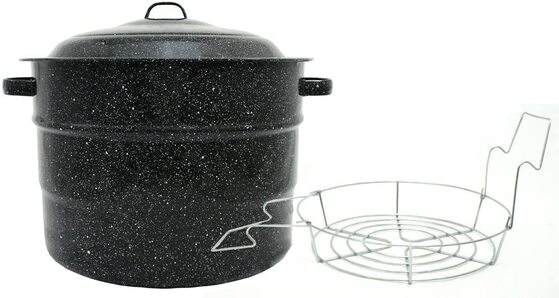|
by Julia Wilson, Edmonson County Extension Agent:
Canning season is in full swing. Safety is of utmost importance for those of us preserving food because improperly home canned food can lead to food-borne illness. Bacteria, yeasts, and molds can grow quickly on fresh fruits and vegetables. Oxygen and enzymes that can cause food to spoil are found all over and inside produce. Safe home canning methods help prevent the growth of these harmful bacteria, yeast and molds; remove excess oxygen from the food; destroy spoilage enzymes; and allow for year-round enjoyment of the foods from your garden. Despite what you may find on the Internet or social media, there are only two acceptable methods for home canning safe, quality products--the boiling water canner method and the pressure canner method. The type of food you are preserving will dictate which method to use. Boiling water canners can be used on foods that are naturally high in acid, like most fruits. Pressure canners must be used for all fresh vegetables, meat and poultry. Both methods, when used properly, can prevent botulism, a deadly form of food poisoning associated with canned food. You can safely process foods that are naturally high in acid or foods that have been acidified with lemon juice or vinegar (like pickles, salsa and relishes) in a boiling water bath canner. The acid prevents the growth of harmful bacteria in these foods. However, vegetables, meats and poultry do not contain enough acid to prevent bacterial growth. For these foods temperatures between 240 and 250 degrees Fahrenheit are necessary to prevent the growth of bacteria. Temperatures this high can only be reached using a pressure canner. Therefore, you must process all vegetables and other low acid foods in a pressure canner. Be sure to use up-to-date equipment that’s in proper working condition. It’s never a good idea to purchase a pressure canner at a yard sale or flea market as replacement parts and manufacturer’s instructions may not be available. Pressure canners made after 1997 are designed with more safety features and weigh much less than older canners. You should test the gauge on dial-gauge pressure canners each year. Your local extension office can do this for you. It is also important to use only Mason-type canning jars and self-sealing, two-piece lids. Never reuse jars that once contained mayonnaise or other food products as they will crack and break during processing. The Edmonson County Extension Office has pressure canners, boiling water canners, and Jam & Jelly makers available for check out. Click here for all the info. Always use research-based recipes to preserve foods. These recipes are available in UK Cooperative Extension Service home canning publications, the Ball Blue Book Guide to Preserving, or the National Center for Home Food Preservation’s website https://nchfp.uga.edu/. Follow each recipe exactly as written. Do not make additions or changes unless options are provided in the recipe. Not following the recipe precisely or using a recipe that is not research-based, may result in sickness. For more information on safe food canning and research-based recipes, contact the Edmonson County Cooperative Extension Service. Educational programs of the Cooperative Extension Service serve all people regardless of economic or social status and will not discriminate on the basis of race, color, ethnic origin, national origin, creed, religion, political belief, sex, sexual orientation, gender identity, gender expressions, pregnancy, marital status, genetic information, age, veteran status, or physical or mental disability.
0 Comments
Your comment will be posted after it is approved.
Leave a Reply. |
Archives
July 2024
|
|
Copyright 2014-2024 The Edmonson Voice.
The Edmonson Voice logos are registered trademarks. Call or text: 270-597-6550 [email protected] PO BOX 94 BROWNSVILLE, KY 42210 CLICK HERE FOR DEADLINE INFO |








